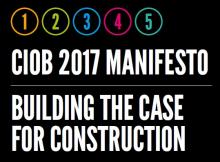CIOB 2017 manifesto
On 11 May 2017, the Chartered Institute of Building (CIOB) published their 2017 manifesto, making the case for construction ahead of the General Election.
To improve policy making and provide a better understanding of the construction industry’s contribution to society, CIOB outlined five interlinked policy proposals for prospective parliamentary candidates and the next government to consider.
Chris Blythe OBE, Chief Executive of the CIOB said:
“The quality of our built environment affects every member of society. Construction creates and maintains the places that people live, work and play, the infrastructure that supports them and the services that sustain them. And it is vital that those elected to represent their constituents in Parliament understand this.
“Our manifesto showcases how construction can act as a solution to major policy issues. Our proposals are interlinked, showcasing the need for a collaborative approach to productivity, skills, quality, investment and Brexit.
“It is crucial that policy makers appreciate the contribution of the construction sector: the decisions made today will be felt for decades and generations.”
The five aims outlined in CIOB’s Building the Case for Construction manifesto are:
- Continue support for the Industrial Strategy and recognise construction’s role in improving productivity.
- Work alongside the construction industry to support a robust system for training and skills development.
- Recognise and address both the opportunities and risks that Brexit will bring.
- Ensure quality is at the heart of the nation’s construction programme.
- Focus on regional investment in construction to rebalance the UK economy.
CIOB will be communicating with prospective parliamentary candidates, urging them to consider the importance of the built environment both at a local and national level.
CIOB has also published a series of articles under the ‘Building the Case for Construction’ banner. This contains a number of resources including an overview of the timetables for the 2017 election and a series of questions for CIOB members and non-members to ask prospective parliamentary candidates.
The full manifesto can be accessed here.
--CIOB
[edit] Find out more
[edit] Related articles on Designing Buildings Wiki
Featured articles and news
A case study and a warning to would-be developers
Creating four dwellings... after half a century of doing this job, why, oh why, is it so difficult?
Reform of the fire engineering profession
Fire Engineers Advisory Panel: Authoritative Statement, reactions and next steps.
Restoration and renewal of the Palace of Westminster
A complex project of cultural significance from full decant to EMI, opportunities and a potential a way forward.
Apprenticeships and the responsibility we share
Perspectives from the CIOB President as National Apprentice Week comes to a close.
The first line of defence against rain, wind and snow.
Building Safety recap January, 2026
What we missed at the end of last year, and at the start of this...
National Apprenticeship Week 2026, 9-15 Feb
Shining a light on the positive impacts for businesses, their apprentices and the wider economy alike.
Applications and benefits of acoustic flooring
From commercial to retail.
From solid to sprung and ribbed to raised.
Strengthening industry collaboration in Hong Kong
Hong Kong Institute of Construction and The Chartered Institute of Building sign Memorandum of Understanding.
A detailed description from the experts at Cornish Lime.
IHBC planning for growth with corporate plan development
Grow with the Institute by volunteering and CP25 consultation.
Connecting ambition and action for designers and specifiers.
Electrical skills gap deepens as apprenticeship starts fall despite surging demand says ECA.
Built environment bodies deepen joint action on EDI
B.E.Inclusive initiative agree next phase of joint equity, diversity and inclusion (EDI) action plan.
Recognising culture as key to sustainable economic growth
Creative UK Provocation paper: Culture as Growth Infrastructure.























